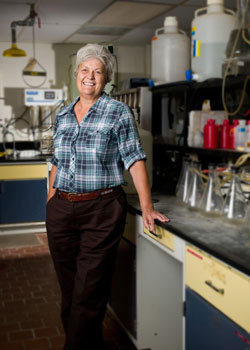Vivien Allen
2010 Texas Tech Integrated Scholar
Paul Whitfield Horn Professor and Thornton Distinguished Professor of Forages;
College of Agricultural Sciences and Natural Resources
 We're going to have more and more people to feed if projections are correct…Staying
in agriculture—keeping agriculture viable economically as well as environmentally
is a big challenge. We have to find ways to do that. With more people, we take more
and more land out of agriculture. So we're doing more with less land and more marginal
land areas.
We're going to have more and more people to feed if projections are correct…Staying
in agriculture—keeping agriculture viable economically as well as environmentally
is a big challenge. We have to find ways to do that. With more people, we take more
and more land out of agriculture. So we're doing more with less land and more marginal
land areas.
What is your research objective/interest(s)?
My interests are two-fold:
1) Water, energy and conservation of natural resources in agricultural production systems
2) Understanding the role of grazing animals in designing integrated crop and livestock systems to improve sustainability of agriculture
How do you feel your research impacts the globe?
Water, energy, and sustainable production of food, fiber, and fuel to meet needs of a growing global population are global issues. As populations continue to increase, agriculture is increasingly regulated to more marginal land areas, often fragile and dependent on irrigation for continued production.
Such expansion is often in direct competition with grazing lands and animal agriculture, and water sources for irrigation in many of these areas are declining. The Texas High Plains exemplifies these challenges. Answers found here have application globally.
Where do you get your inspiration?
From students, colleagues, friends, travel, the literature, the challenges faced by producers, a largely uninformed public, the need for rational policies, the rapid loss of agricultural lands, and from my own farm in Tennessee and a family history with a passion for the land.
What type(s) of service projects do you enjoy doing?
I have enjoyed serving as president of two major scientific societies and as chair of the International Grassland Congress. My travels and associations through these opportunities led to working with a colleague at Lanzhou University in Lanzhou, China to develop collaboration between Texas Tech and Lanzhou University for student education and scientist exchanges in both agriculture and in medicine. I enjoy working directly with producers, industry, the public, government agencies, and those involved in policy in agriculture. They bring reality to what we do and are full partners in our efforts. Of particular interest to me on the educational side has been the development of a multi-university graduate field trip course to bring students from across the country and internationally to see and learn firsthand about the ecology of grazing lands. Another particular interest has been to twice chair an international committee to clarify terms and their definitions for the language we use for grazing lands and grazing animals.
What are you currently working on?
Our current efforts include field-scale comparisons of agricultural monocultures with integrated crop and livestock systems and a network of on-farm producer-driven systems comparisons to find ways to improve water conservation and ensure profitability. Within these research and demonstration/education platforms, we investigate water use efficiency of specific forages, crops, and the overall system; energy balance of systems; the role of forages and grazing animals to achieve these goals; identification of legume species and varieties for improved animal performance and nitrogen fixation with no additional water costs; allelopathic effects of small grains in crop rotations and the role of grazing animals in modifying these effects; mineral cycling in the soil-plant-animal system; and other characteristics and impacts of the various systems on the ecosystem.
What advice do you have for new faculty members on balancing the components of an integrated scholar into their careers (academics, research and service)?
The balance will depend on the specific career, but to the extent possible, a broad, integrated, and interdisciplinary approach is rewarding. Opportunities are greater to find and explore those aspects for which you will discover a passion. Follow your passions and never be afraid to try. To the extent possible, don't wait until you have funding in hand. Identify the objective, find a way to proceed, and find the funding as you go.
Scholar Background
- Born in Nashville Tennessee and Educated (K-12) at George Peabody Demonstration School, Nashville
- Also grew up on family farm at Huntland, Tennessee. The farm was acquired by my grandparents in the late 1800s. I acquired the farm from my parents' estate in the 1970s, and today I raise forages and Angus cattle (cow-calf) on this farm.
- B.S., General Agriculture with a minor in music from the University of Tennessee, Martin
- M.S., Agronomy with a minor in reproductive physiology from Louisiana State University
- Ph.D., Agronomy with a minor in animal nutrition from Louisiana State University
Office of the Provost
-
Address
104 Administration Building, Box 42019, Lubbock, Texas 79409-2019 -
Phone
806.742.2184 -
Email
provost.communications@ttu.edu
